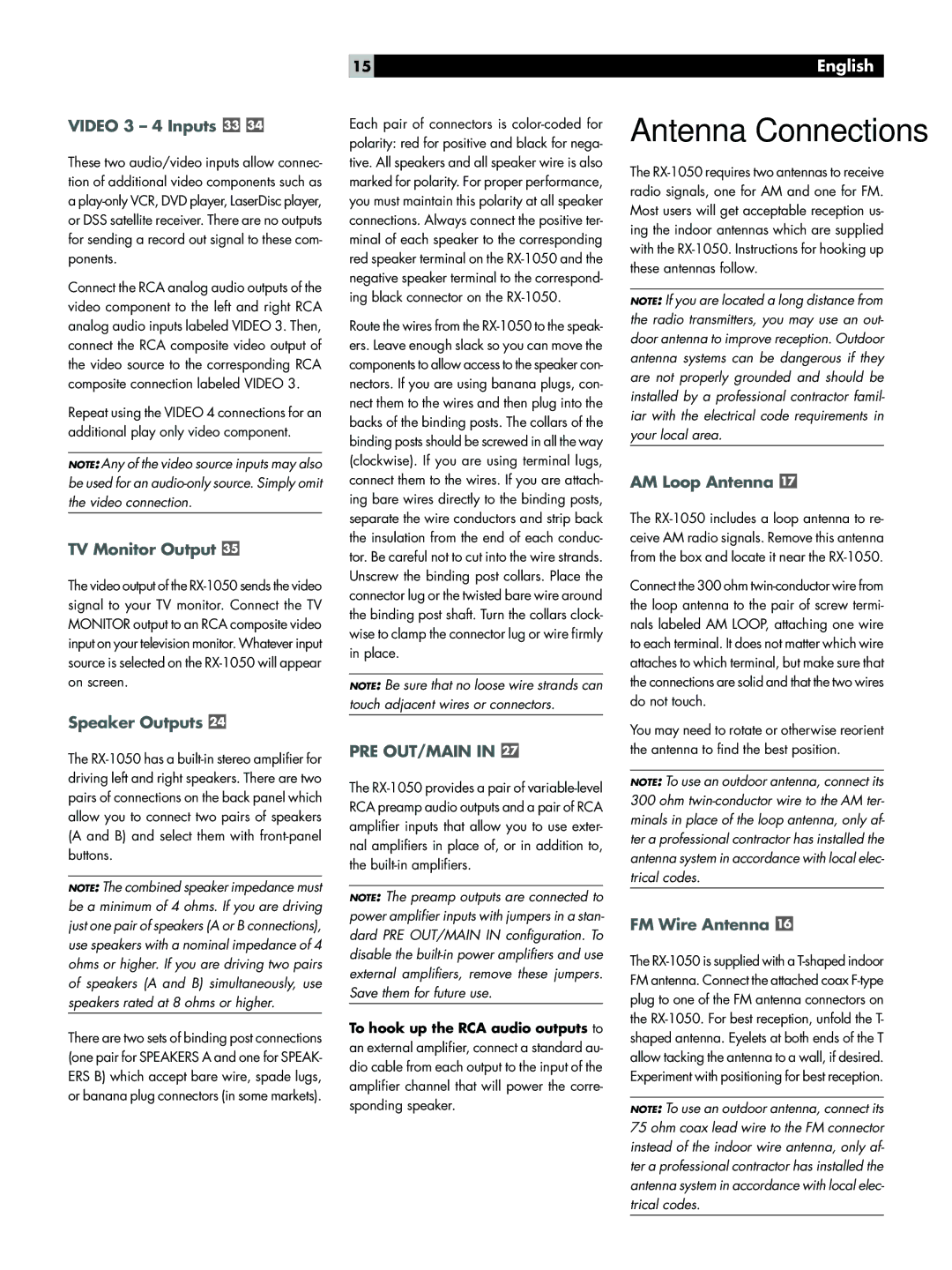VIDEO 3 – 4 Inputs 

These two audio/video inputs allow connec- tion of additional video components such as a play-only VCR, DVD player, LaserDisc player, or DSS satellite receiver. There are no outputs for sending a record out signal to these com- ponents.
Connect the RCA analog audio outputs of the video component to the left and right RCA analog audio inputs labeled VIDEO 3. Then, connect the RCA composite video output of the video source to the corresponding RCA composite connection labeled VIDEO 3.
Repeat using the VIDEO 4 connections for an additional play only video component.
NOTE: Any of the video source inputs may also be used for an audio-only source. Simply omit the video connection.
TV Monitor Output 
The video output of the RX-1050 sends the video signal to your TV monitor. Connect the TV MONITOR output to an RCA composite video input on your television monitor. Whatever input source is selected on the RX-1050 will appear on screen.
Speaker Outputs 
The RX-1050 has a built-in stereo amplifier for driving left and right speakers. There are two pairs of connections on the back panel which allow you to connect two pairs of speakers (A and B) and select them with front-panel buttons.
NOTE: The combined speaker impedance must be a minimum of 4 ohms. If you are driving just one pair of speakers (A or B connections), use speakers with a nominal impedance of 4 ohms or higher. If you are driving two pairs of speakers (A and B) simultaneously, use speakers rated at 8 ohms or higher.
There are two sets of binding post connections (one pair for SPEAKERS A and one for SPEAK- ERS B) which accept bare wire, spade lugs, or banana plug connectors (in some markets).
Each pair of connectors is color-coded for polarity: red for positive and black for nega- tive. All speakers and all speaker wire is also marked for polarity. For proper performance, you must maintain this polarity at all speaker connections. Always connect the positive ter- minal of each speaker to the corresponding red speaker terminal on the RX-1050 and the negative speaker terminal to the correspond- ing black connector on the RX-1050.
Route the wires from the RX-1050 to the speak- ers. Leave enough slack so you can move the components to allow access to the speaker con- nectors. If you are using banana plugs, con- nect them to the wires and then plug into the backs of the binding posts. The collars of the binding posts should be screwed in all the way (clockwise). If you are using terminal lugs, connect them to the wires. If you are attach- ing bare wires directly to the binding posts, separate the wire conductors and strip back the insulation from the end of each conduc- tor. Be careful not to cut into the wire strands. Unscrew the binding post collars. Place the connector lug or the twisted bare wire around the binding post shaft. Turn the collars clock- wise to clamp the connector lug or wire firmly in place.
NOTE: Be sure that no loose wire strands can touch adjacent wires or connectors.
PRE OUT/MAIN IN 
The RX-1050 provides a pair of variable-level RCA preamp audio outputs and a pair of RCA amplifier inputs that allow you to use exter- nal amplifiers in place of, or in addition to, the built-in amplifiers.
NOTE: The preamp outputs are connected to power amplifier inputs with jumpers in a stan- dard PRE OUT/MAIN IN configuration. To disable the built-in power amplifiers and use external amplifiers, remove these jumpers. Save them for future use.
To hook up the RCA audio outputs to an external amplifier, connect a standard au- dio cable from each output to the input of the amplifier channel that will power the corre- sponding speaker.
Antenna Connections
The RX-1050 requires two antennas to receive radio signals, one for AM and one for FM. Most users will get acceptable reception us- ing the indoor antennas which are supplied with the RX-1050. Instructions for hooking up these antennas follow.
NOTE: If you are located a long distance from the radio transmitters, you may use an out- door antenna to improve reception. Outdoor antenna systems can be dangerous if they are not properly grounded and should be installed by a professional contractor famil- iar with the electrical code requirements in your local area.
AM Loop Antenna 
The RX-1050 includes a loop antenna to re- ceive AM radio signals. Remove this antenna from the box and locate it near the RX-1050.
Connect the 300 ohm twin-conductor wire from the loop antenna to the pair of screw termi- nals labeled AM LOOP, attaching one wire to each terminal. It does not matter which wire attaches to which terminal, but make sure that the connections are solid and that the two wires do not touch.
You may need to rotate or otherwise reorient the antenna to find the best position.
NOTE: To use an outdoor antenna, connect its 300 ohm twin-conductor wire to the AM ter- minals in place of the loop antenna, only af- ter a professional contractor has installed the antenna system in accordance with local elec- trical codes.
FM Wire Antenna 
The RX-1050 is supplied with a T-shaped indoor FM antenna. Connect the attached coax F-type plug to one of the FM antenna connectors on the RX-1050. For best reception, unfold the T- shaped antenna. Eyelets at both ends of the T allow tacking the antenna to a wall, if desired. Experiment with positioning for best reception.
NOTE: To use an outdoor antenna, connect its 75 ohm coax lead wire to the FM connector instead of the indoor wire antenna, only af- ter a professional contractor has installed the antenna system in accordance with local elec- trical codes.

